外研版2017年中考一轮教材复习课件:七年级上册 Modules 6-10
文档属性
| 名称 | 外研版2017年中考一轮教材复习课件:七年级上册 Modules 6-10 | 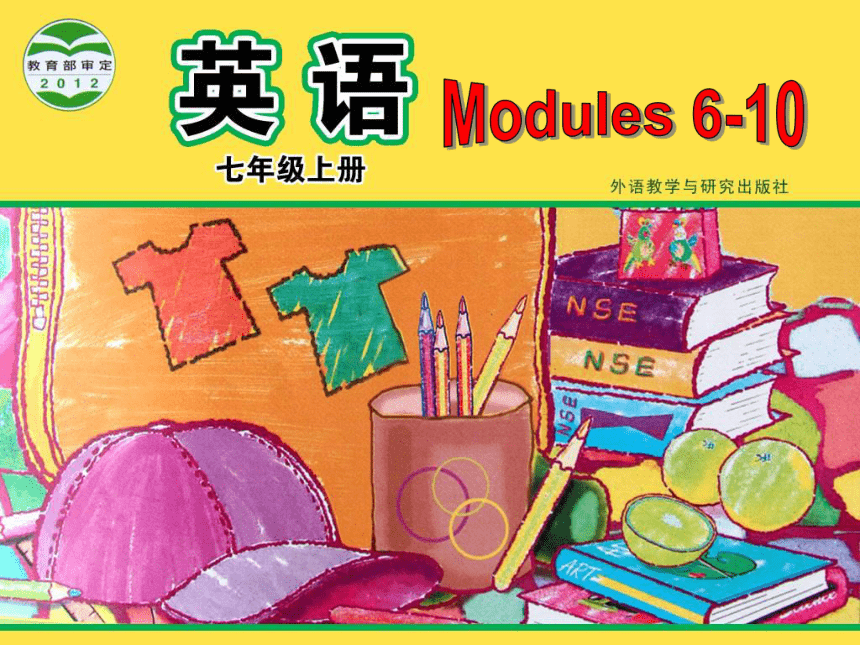 | |
| 格式 | zip | ||
| 文件大小 | 336.9KB | ||
| 资源类型 | 教案 | ||
| 版本资源 | 外研版 | ||
| 科目 | 英语 | ||
| 更新时间 | 2017-01-25 16:22:33 | ||
图片预览


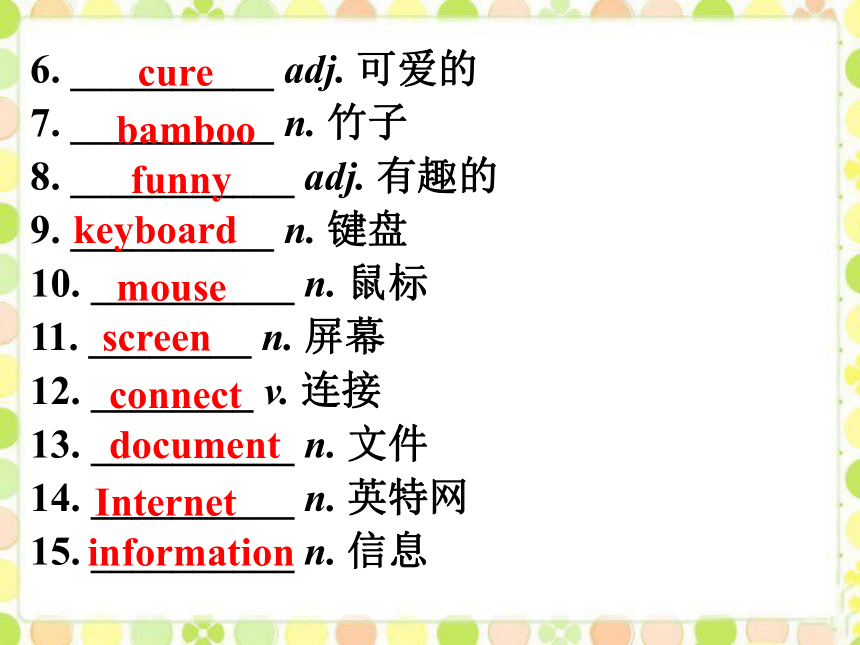
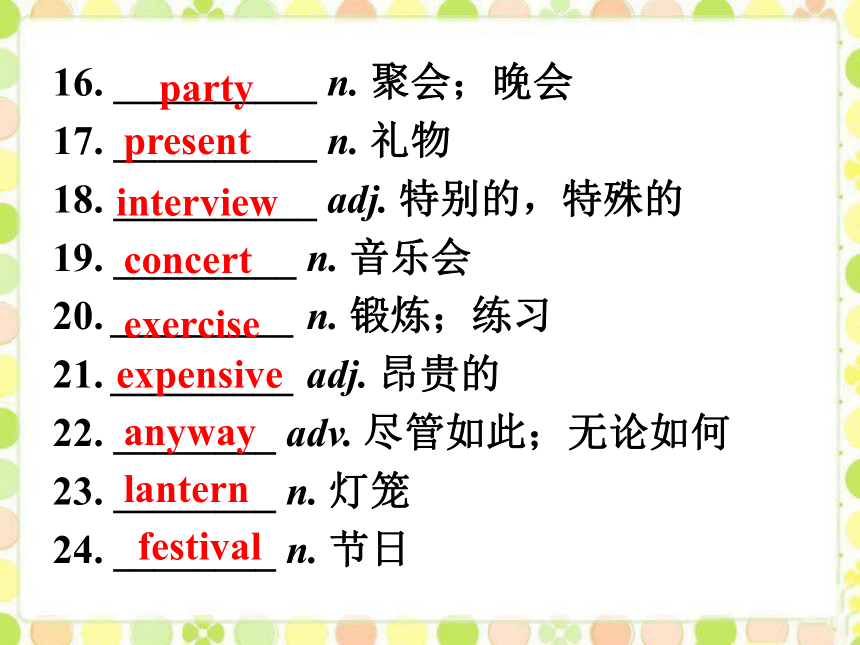
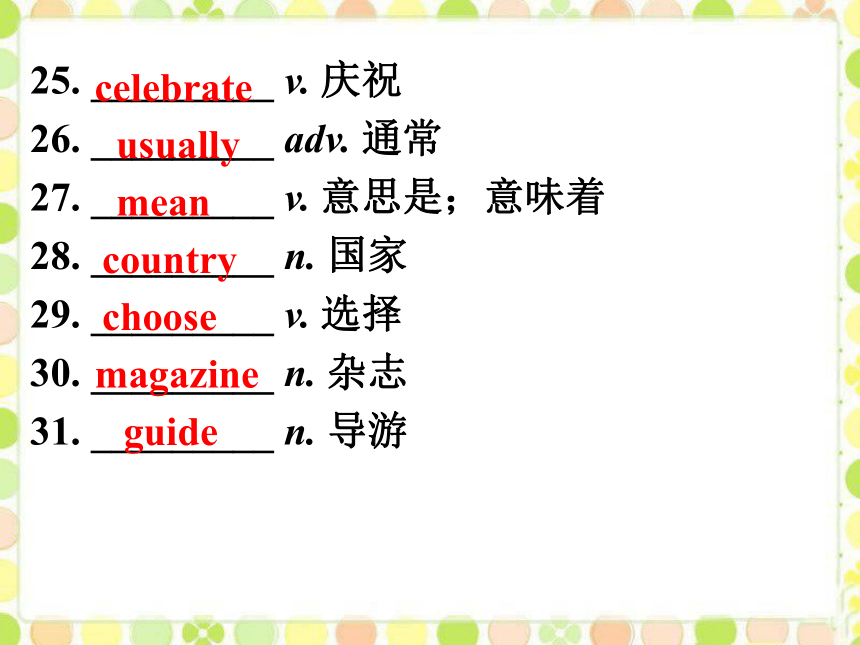
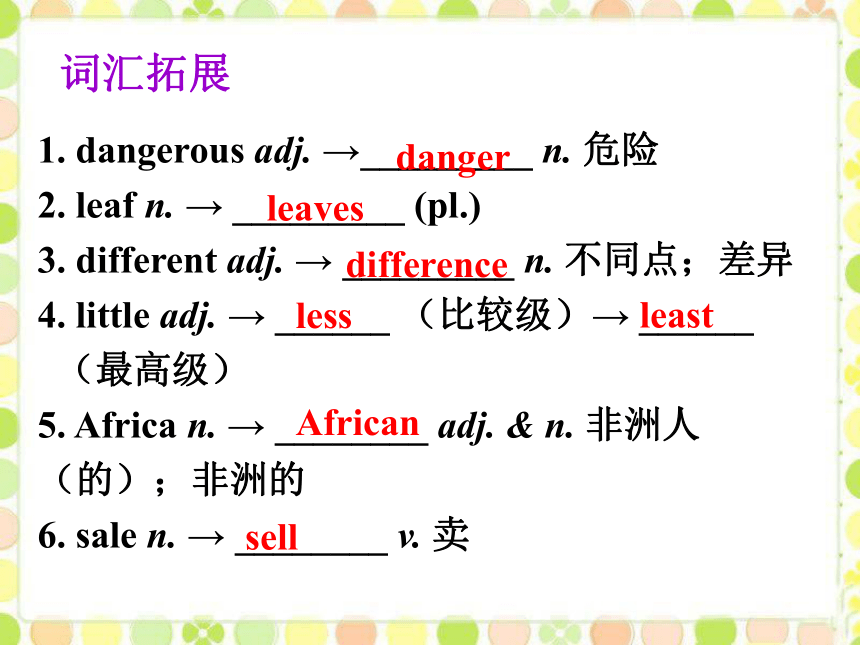
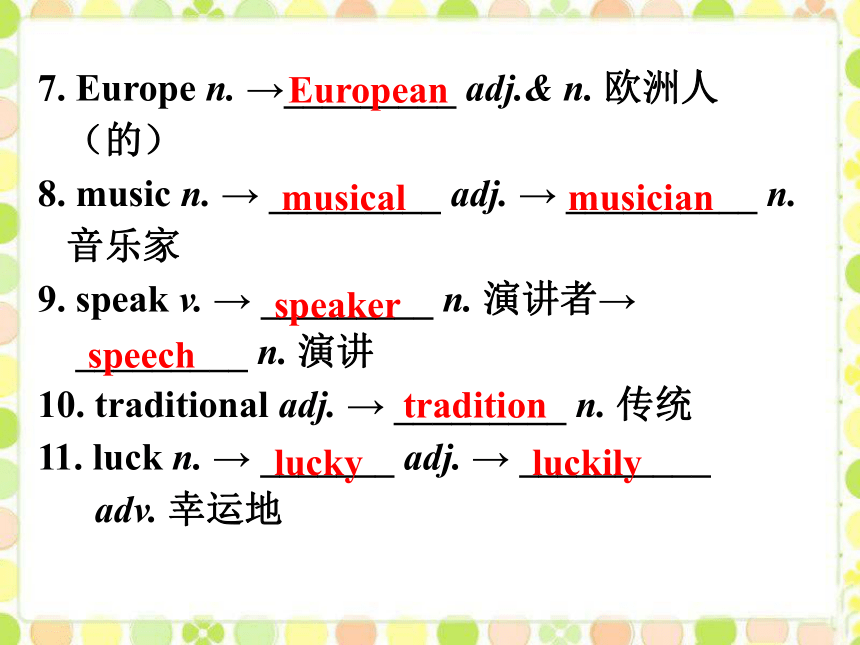
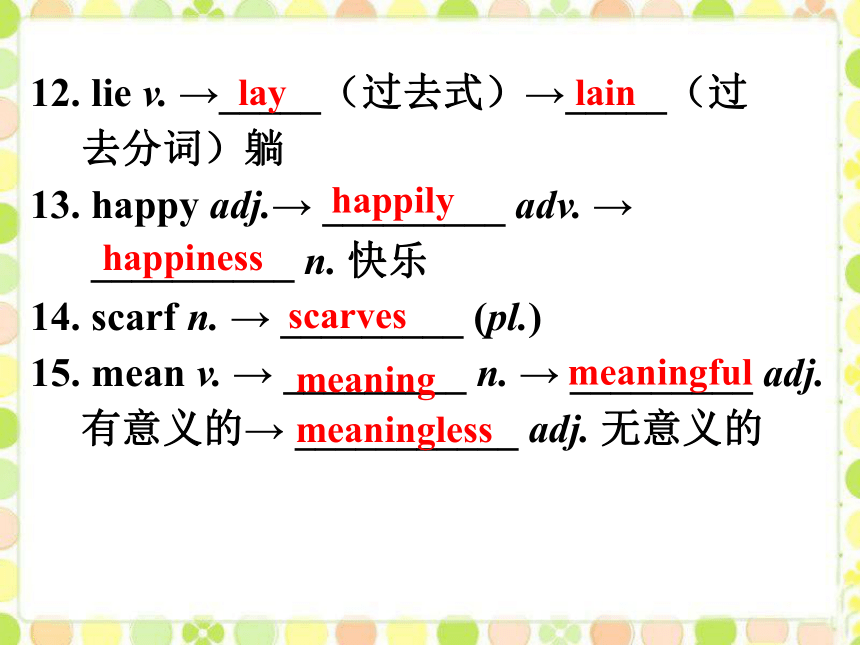
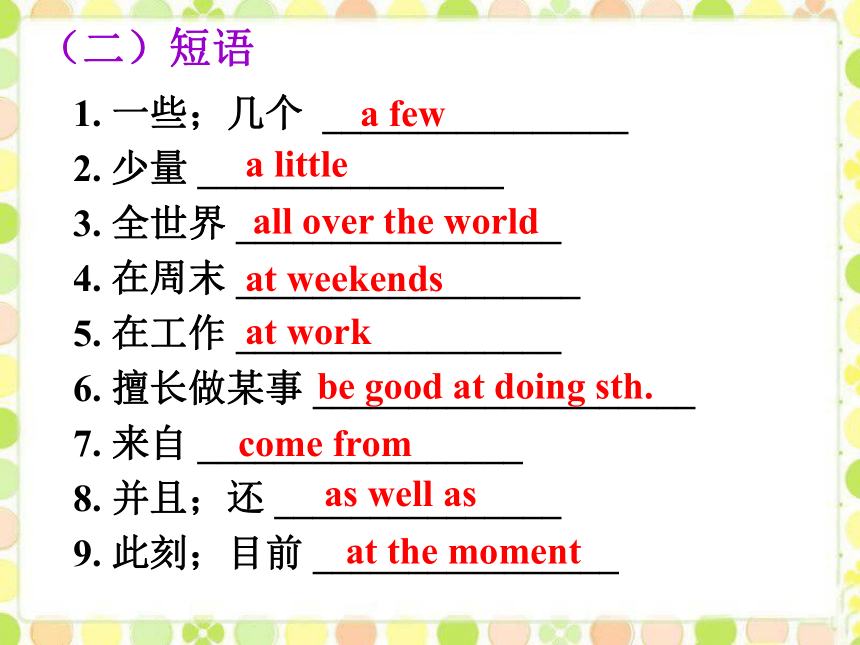
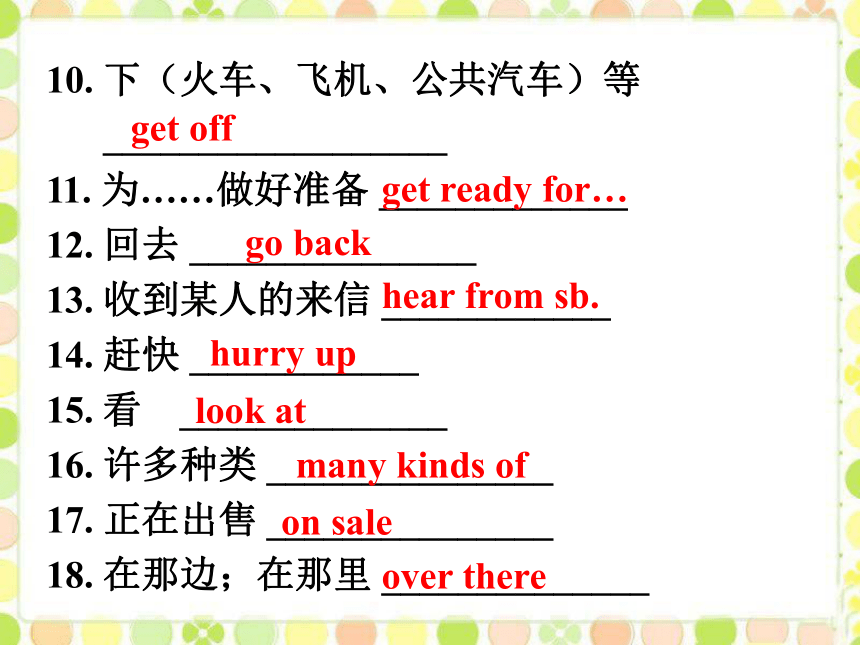
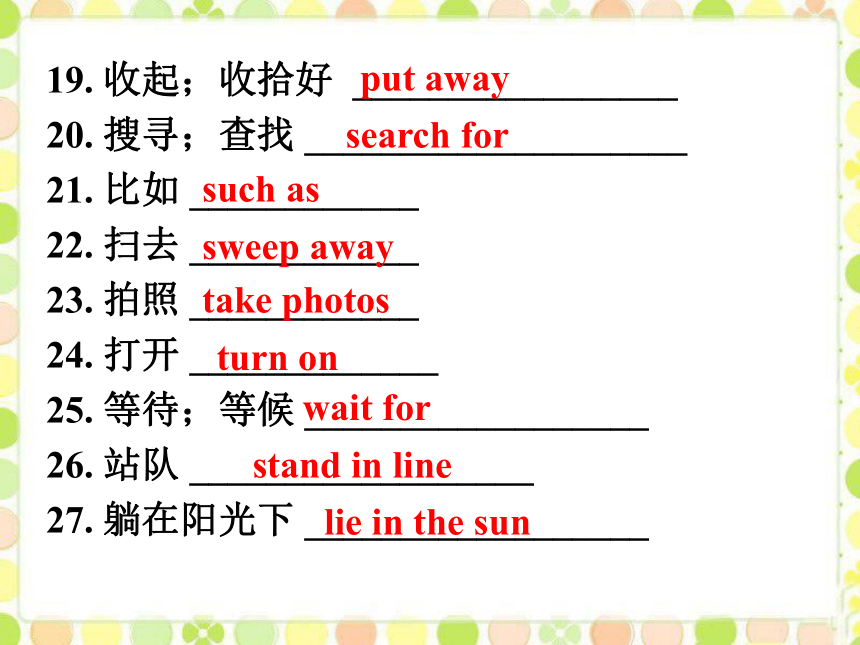
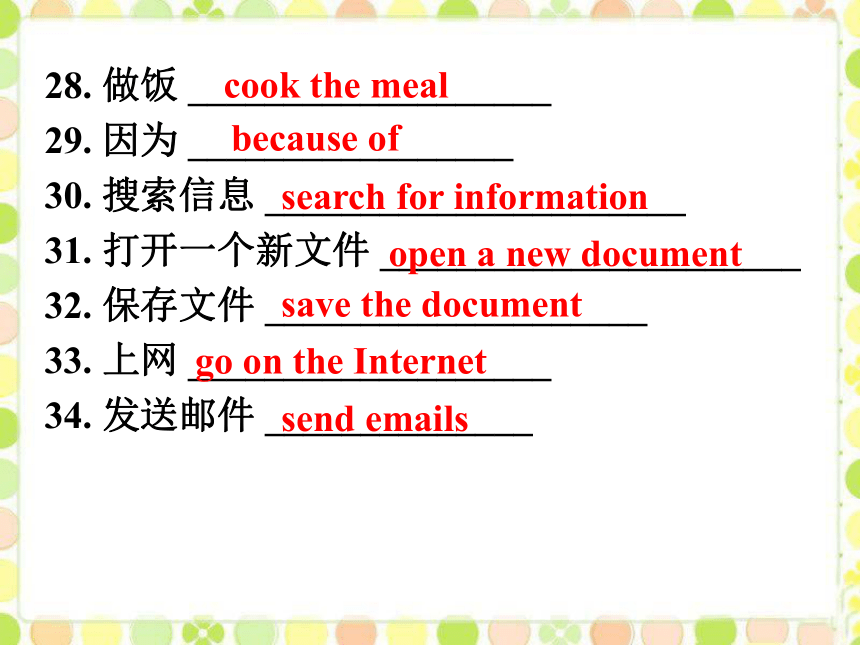
文档简介
课件89张PPT。Modules 6-101. _________ n. 大象
2. _________ n. 长颈鹿
3. _________ n. 狮子
4. _________ n. 动物
5. _________ adj. 危险的elephantgiraffelionanimaldangerous(一)单词知识清单6. __________ adj. 可爱的
7. __________ n. 竹子
8. ___________ adj. 有趣的
9. __________ n. 键盘
10. __________ n. 鼠标
11. ________ n. 屏幕
12. ________ v. 连接
13. __________ n. 文件
14. __________ n. 英特网
15. __________ n. 信息curefunnykeyboardscreendocumentconnect bamboomouseInternetinformation16. __________ n. 聚会;晚会
17. __________ n. 礼物
18. __________ adj. 特别的,特殊的
19. _________ n. 音乐会
20. _________ n. 锻炼;练习
21. _________ adj. 昂贵的
22. ________ adv. 尽管如此;无论如何
23. ________ n. 灯笼
24. ________ n. 节日expensiveexercisepartyinterviewconcertanywaypresentlanternfestival25. _________ v. 庆祝
26. _________ adv. 通常
27. _________ v. 意思是;意味着
28. _________ n. 国家
29. _________ v. 选择
30. _________ n. 杂志
31. _________ n. 导游meancelebrate usuallycountrychoosemagazineguide词汇拓展1. dangerous adj. →_________ n. 危险
2. leaf n. → _________ (pl.)
3. different adj. → _________ n. 不同点;差异
4. little adj. → ______ (比较级)→ ______
(最高级)
5. Africa n. → ________ adj. & n. 非洲人(的);非洲的
6. sale n. → ________ v. 卖dangerleavesdifferencelessleastAfrican sell7. Europe n. →_________ adj.& n. 欧洲人
(的)
8. music n. → _________ adj. → __________ n.
音乐家
9. speak v. → _________ n. 演讲者→
_________ n. 演讲
10. traditional adj. → _________ n. 传统
11. luck n. → _______ adj. → __________
adv. 幸运地Europeanmusicalmusicianspeakerspeechtraditionluckilylucky12. lie v. →_____(过去式)→_____(过
去分词)躺
13. happy adj.→ _________ adv. →
__________ n. 快乐
14. scarf n. → _________ (pl.)
15. mean v. → _________ n. → _________ adj.
有意义的→ ___________ adj. 无意义的laylainhappilyhappinessscarvesmeaningmeaningfulmeaningless1. 一些;几个 ________________
2. 少量 ________________
3. 全世界 _________________
4. 在周末 __________________
5. 在工作 _________________
6. 擅长做某事 ____________________
7. 来自 _________________
8. 并且;还 _______________
9. 此刻;目前 ________________(二)短语a fewa littleall over the worldat weekendsat workbe good at doing sth.come fromas well asat the moment10. 下(火车、飞机、公共汽车)等 __________________
11. 为……做好准备 _____________
12. 回去 _______________
13. 收到某人的来信 ____________
14. 赶快 ____________
15. 看 ______________
16. 许多种类 _______________
17. 正在出售 _______________
18. 在那边;在那里 ______________get off go backget ready for… over there hear from sb.hurry uplook atmany kinds ofon sale19. 收起;收拾好 _________________
20. 搜寻;查找 ____________________
21. 比如 ____________
22. 扫去 ____________
23. 拍照 ____________
24. 打开 _____________
25. 等待;等候 __________________
26. 站队 __________________
27. 躺在阳光下 __________________put awaysearch for such assweep awaytake photosturn onwait forstand in linelie in the sun28. 做饭 ___________________
29. 因为 _________________
30. 搜索信息 ______________________
31. 打开一个新文件 ______________________
32. 保存文件 ____________________
33. 上网 ___________________
34. 发送邮件 ______________cook the mealbecause ofsearch for informationopen a new document save the document go on the Internetsend emails 1. They come from different countries…
它们来自许多不同的国家……
2. — Shall we go and see them?
我们去看看他们好吗??
— Yes, let’s go.
好的,我们走吧。
3. How do I write my homework on the computer?
我如何在电脑上写作业?(三)句型4. First, open a new document… Next, you write your homework… then click “save” …Finally
首先,新建一个文档……下一步,写你的作业……然后,点击“保存”……最后……
5. … would you like to come to my birthday party??
你愿意来参加我的生日聚会吗?
6. Anyway, it's time to go back to school now.
无论如何,现在到返校的时间了。7. I’m visiting my friends in Hollywood at the moment…
我现在正在好莱坞拜访我的朋友……
8. This is Tony speaking.
我是托尼。1. different adj. 不同的
(1)different修饰名词时,名词通常为复数形
式。
(2)常用结构:be different from…。其反义
词组为the same as。核心要点(一)单词2. other adj. 其他的
other是形容词,后接可数名词复数形式。
[拓展] other的常见用法:
(1)“other+复数可数名词”=others, 泛指剩余中的一部分。
(2)“the other+复数可数名词”= the others, 特指剩下的去全部。
(3)“one…the other…”意为“(两者中)一个……另一个……”。3. also adv. 也;而且
[辨析] also, too与either
also用于句中,常放在be动词、情态动词或助动
词之后,实义动词之前。
too通常用于肯定句和疑问句句末,与前句有无
逗号隔开均可。
either用于否定句的句末,且一般用逗号与前句
隔开。
注意:also与too通常可以互换。用also, too或either填空。
(1) He ________ likes swimming.
(2) She is a student, _________.
(3) I don’t like black. She doesn’t like it,
__________.alsotooeither4. call v. 把……叫做;称呼……为
call过去分词called, “called+名词”意为“叫……的”,通常作后置定语,位于所修饰词的后面,也可以用named来代替。
[拓展] call还有“打电话”的意思。常用短语:call sb. (up)/ give sb. a call给某人打电话
5. little adj. 极少量的
(1)little修饰不可数名词,表示否定含义。
(2)a little还有“有点儿;稍微”的意思,修饰形容词或副词,用法与a bit类似。但如果后接不可数名词时,a bit后面需要加上of。6. leaf n. 叶子
leaf用作可数名词,意为“叶子”。它变复数时要变f为ve, 再加s, 即leaves。
[拓展] 类似的名词有half, wife等。巧记口诀:
树叶(leaf)半数(half)自己(self)黄,
妻子(wife)拿刀(knife)去割粮,
架(shelf)后窜出一只狼(wolf),
就像小偷(theif)逃命(life)亡。7. alone adv. 独自地
alone在句中作副词,表示客观数量上只有一个,不具有感彩。
[辨析] alone与lonely
alone作形容词,强调客观上的“独自;单独一人”,在句中多作表语或宾语补足语,不能作定语;还可以作副词,表示“单独地;独自地”,在句中作状语。lonely除了表示“单独”外,还带有感彩,表
示心理上的孤独、寂寞。它只能作形容词,在
句中作表语,也可用作前置定语。修饰地点时,
意为“荒凉的;偏僻的”。
用alone或lonely填空。
(1) Don’t leave the baby ______ at home.
(2) When his wife and two little children left him,
he was very ______.
(3) I never feel ______ because I have a lot of
friends here.
(4) The old man lives ________, but he
never feels _____.alonelonelylonelyalonelonely8. connect v. 连接
connect…to/ with…意为“把……与……连接”。但是,当主语是物时,connect只能与with连用。
9. turn n. 转动
turn on意为“打开;接通(电源、电器)”,其反义短语是turn off。
注意:这两个短语均为副词短语,代词作宾语时,必须放在动词和副词中间;名词作宾语时,放在动词和副词中间或副词后面均可。[拓展] turn up意为“调高(音量)”;turn down意为“调低(音量)”。
[辨析] turn off/ on与open/ close
turn on/ off 主要用于开/ 关电视、电脑等电器。
open/ close 常用于打开/ 关闭门窗,箱子等。
10. learn v. 学;学习
learn可作及物动词或不及物动词。
[拓展] learn常见用法:
(1)learn from sb. 意为“向某人学习”。
(2)learn to do sth. 意为“学习做某事”。
(3)learn about意为“得知;了解”。11. use v. 使用
use是及物动词,后可直接接使用的工具。常用结构为:use sth. to do sth.或use sth. for sth.。
[拓展]
(1)useful为形容词,意为“有用的;有益
的”。
(2)used为形容词,意为“用过的;二手的”。12. save v. 保存;储存
[拓展] save的其他用法:
(1)save意为“挽救;拯救”。save one’s life意为“拯救某人的生命”。
(2)save意为“节省;节约”。
13. plan n. 计划 v. 计划;打算
(1)plan作名词,意为“计划”,是可数名词。常用搭配:make a plan/ make plans制定计划。(2)plan作动词,意为“计划;打算”,后可接
动词不定式作宾语。常用搭配:plan to do sth.计划作某事;plan for sth. 为某事做计划。
14. ticket n. 票
ticket是可数名词,一般用名词作它的定语,且名词放在ticket的前面,表示“……的票”。
[拓展] ticket后可接介词to或for,表示“……的票”。
15. search v. 搜寻;搜索;查找
固定搭配:search for搜寻;查找[辨析] search与search for
search 表示对地点进行搜索
search for表示搜索资料、文件、失踪的人等。
16. information
information是不可数名词,不能直接与不定冠词a或an连用。若要表达“一条信息”,用a piece of information;表达“两条信息”要用two pieces of information。
[拓展] information后面常接介词on或about, 表示“关于……的信息”。[辨析] information与news
information常指通过观察、学习、阅读或上网得到的信息,强调“内容”。
news为不可数名词,一般指报纸、电视等媒体向社会报道的最新消息。
17. sometimes adv. 有时候;有时
sometimes是个频度副词,表示偶尔发生,在句中位于be动词之后,实义动词之前,常用于一般现在时,与always,usually,often,seldom,never用法相同。[拓展] sometimes, often, usually, twice a week等频度副词或词组,常用how often来提问。
[辨析] sometimes, sometime, some time与some times
sometimes adv. 有时
sometime adv. 在某个时候,可用于一般过去时与将来时。
some time 名词短语,意为“一段时间”;time是不可数名词。
some times名词短语,意为“几次”;time是可数名词,意为“次”。18. visit v. 探望;参观
visit后面直接跟人或地点。
[拓展] (1)visit可作名词,意为“参观”,常用搭配为:be on a visit to…, 意为“在……旅游”。
(2)visitor为名词,意为“参观者”。
19. never adv. 从不
never是否定词,常与一般现在时连用,用在行为动词之前,构成否定句。
[拓展] 在含有never的句子中,常用or代替and。20. give v. 给,送
give后面常跟双宾语(指人的方向为间接宾语,指物为直接宾语)。常用搭配:give sb. sth.=give sth. to sb.送给某人某物。
注意:若直接宾语时代词时,只能用“give sth. to sb.”结构。
[拓展] 与give用法类似的单词还有send, show, pass等。buy, make后面也可以跟双宾语,只是直接宾语在前时,后面的介词要用for。21. choose v. 选择;挑选
(1)choose为及物动词,后面接名词作宾语。表示选择的范围时,可以根据句意选用不同的介词,如from, between。
(2)choose的常见搭配:
choose to do sth.意为“选择做某事”。
choose sb. to do sth.意为“选择某人去做某事”。
choose…as…意为“选……作为……”。22. exercise n. 锻炼;练习
exercise表示“锻炼”时,为不可数名词;表示“操(训练的一套动作)”或“练习”时,为可数名词。
23. spend v. 花钱;花费
spend+时间/金钱+(in)doing sth. 花费时间或金钱做某事
spend+时间/金钱+ on sth. 花费时间或金钱在某物上
[拓展] 其他有关“花费”的用法
pay 主语是人,sb. pay money for sth.cost主语是物,sth. cost sb. +money
take主语是it, It takes sb. some time to do sth.
24. hear v. 听见
(1)hear from意为“收到……的来信”,后面可接人,也可接地点,表示收到某人或某地的来信,与“get/ receive a letter from”为同义表达。
(2)hear of意思是“听说”;hear about表示“听说(某人或某事)”。25. lie v. 躺;平躺
lie第三人称单数形式lies, 现在分词形式lying。常用搭配:lie in the sun晒太阳;lie under the tree躺在树下;lie under the tree 躺在树下;lie in the bed躺在床上;lie on the floor 躺在地板上;lie down躺下
[拓展] lie还可以表示“位于;处于”
(1)Mike is _____ __ ___ ____(躺在床上)and
watching TV.
(2)If(如果)you don’t feel very well, you
should __ _____(躺下来)and have a rest.lying in the bedlie down26. wait v. 等待,等候
wait for sb./ sth. 意为“等待某人/ 物”
wait for sb. to do sth.意为“等某人去做某事”
27. enjoy v. 享受……的乐趣;喜爱
enjoy后接名词、代词或动词-ing形式作宾语,不能接动词不定式。enjoy doing sth. “喜欢做某事”。
[拓展] enjoy oneself 玩得开心,过得愉快
[辨析] enjoy 与like
enjoy用于进行时,后接名词、代词或动词-ing形式。
like不用于进行时,like to do sth. 强调意愿;like doing sth. 强调爱好,但有时两者可以互换。28. leave v. 离开
后可接表示地点的名词或副词。leave for动身前往
[拓展] leave还表示“遗留、遗忘”,常于地点副词连用,意为“把某物忘在/落在某处”。
29. most adj. 大部分;大多数
most+名词,most是形容词,表示“大多数的;大部分的”,表示泛指;most of+名词,most是代词,表示“大多数;大部分”,若名词是特定的,前面必须用定冠词the或形容词性物主代词修饰。30. study v. 学习;研究
及物动词,后接名词作宾语。
[拓展] 也可作不及物动词,“学习”。
[辨析] study与learn
study侧重深度研究及深入、系统地学习,强调主观赏努力学习的动作。
learn多指初学阶段或模仿性的技术操作,强调学习的结果。
用study,learn适当形式填空。
(1)They _______ medicine in the university.
(2)She will _______ to ride a horse this year.studylearn31. sweep v. 打扫;清扫
后面直接接宾语,接表示“地板;天花板”的名词。
[拓展] clean指广泛意义上的打扫,有“擦、洗、扫”等意思。do some cleaning 打扫卫生。可以作形容词,表示“干净的”。
32. cook v. 烹饪;煮;烧
[拓展] cook作名词,表示“厨师”。
cooker n. 炊具
cook…for sb.= cook sb. 为某人做……33. happen v. 发生
不及物动词。指偶尔或无计划之事发生,主语多为所发生的事情或疑问代词what。
[拓展] 常见用法:
(1)sth.+happen+地点/时间 “某地/ 某时发生了什么事”
(2)sth.+happen+to sb. “某人发生了某事”
(3)sb.+happen+to do sth. “某人碰巧做某事”34. ready adj. 有准备的;准备好的
be ready “做好准备”,
[拓展] 常见用法:
(1)sth.+happen+地点/时间 “某地/ 某时发生了什么事”
(2)sth.+happen+to sb. “某人发生了某事”
(3)sb.+happen+to do sth. “某人碰巧做某事”
35. join v. 参加;加入
join一般指加入某一组织、团体或群体;还有“链接;使结合”的意思。
[拓展] join…in/ for “和……一起……,和……做伴”。36. hurry v. 匆忙;赶快
(1)hurry up “赶快”,用于祈使句。
(2)hurry to+地点名称 “匆忙去某地”
[拓展] hurry to do sth. “匆忙做某事”
hurry作名词,in a hurry “匆忙地”=quickly。1. as well as 并且,还
链接两个并列成分,表示“除……之外,……也;不但……而且……”。强调的是前一项,所以链接两个并列主语时,谓语动词要与前一项保持一致。
[拓展] as well as还可表示同级比较,指“和……一样好”。(二)短语2. be good at 擅长
at后可接名词、代词或v-ing形式,同义词组为do well in。
3. go back回去
go back 强调动作。be back意为“返回”,强调状态。
[拓展] get back 回来,返回
come back回来 call back 回电话 walk back走回来 write back 回信
4. sweep away 扫去
表示把不必要的、不好的、不吉祥的东西清除干净。1. —Shall we go and see them?
— Yes, let’s go.
Shall we/ I …? “我们/ 我……好吗?”后接动词原形,表示征求对方的意见。
肯定回答:Yes, let’s…/ OK./ Good idea./ Sure.
否定回答:No, let’s…
[拓展] 提建议的方式:
Shall we do sth.?
What/ How about doing sth.?
Let’s do sth.!(三)句型2. They come from many different countries…
come from…“来自……”, 同义词组be from。
3. How do I write my homework on the
computer?
特殊疑问句结构:特殊疑问词+一般疑问句?
特殊疑问词:how, what, when, where, how many。
4. First, open a new document…Next, you
write your homework… then click
“save”…Finally…描述动作过程的先后顺序,常用副词first, next, then, finally等。
5. Hi, would you like to come to my birthday
party?
Would you like…?用来询问对方意见、邀请或请求别人做某事的一种委婉表达。比同义表达“Do you want…?”更有礼貌。
句式转化:
(1)肯定句:主语+would like +to do sth.
(2)否定句:主语+would not like+ to do sth.注意:在肯定句中,would常与前面的主语缩写’d。
6. Anyway, it’s time to go back to school now.
(1)anyway为副词,“无论如何,反正”,用于转换话题或结束谈话。anyway作副词时,还表示“不论以何种方式”。
(2)It’s time to do sth. 到做某事的时间了
It’s time for+名词 到……的时间了7. I’m visiting my friends in Hollywood at the
moment…
at the moment现在,此时。
[拓展] at this moment 在这个时候
at that moment 在那个时候
in a moment 一会儿,马上
8. This is Tony speaking.
打电话常用语。打电话问对方是谁用“Who’s that?”或“Who’s that speaking?”;回答自己是谁用“This is …”或者“This is …speaking”。打电话常用语:
Hello, this is …
May I speak to…please?
Who’s that speaking?/ Who’s that?一般现在时语法用法
1. 一般现在时表示经常性或习惯性的动作或
事物存在的状态,常与always, often,
usually, sometimes, once a week, every day
等频度副词或时间状语连用。如:
My mum often gets up at 6 o'clock in the
morning. 2. 一般现在时表示主语具备的性格和能力
等。 如:
He is good at English.
3. 一般现在时表示客观事实或普遍真理。
如:
The sun rises in the east.
4. 一般现在时表示将来:
(1) 表示将来确定会发生的动作(如已安排或计划好的动作),go, come, leave, start, arrive, be等动词常可以这样使用。如:
The train leaves at 7:30 pm. (2) 在时间或条件等状语从句中,用一般现在时表示将来的动作。如:
I’ll let you know as soon as I hear from him.
He’ll go if it is fine tomorrow.
5. 在某些以here, there开头的句子中用一般现在时表示正在发生的动作。如:
Here comes the bus.结构现在进行时用法
1. 现在进行时表示说话时正在进行或发生的动
作。如:
Mr Smith is giving a talk now.
Is it raining now?
2. 现在进行时表示当前一段时间内的活动或现
阶段正在进行的动作。如:
We’re preparing for the project these days.结构1. —Where is Joan?
—She ________ a novel in her study.?
A. has read????????? ?B. reads????? ????
C. will read???? ??????D. is reading (2015 江苏苏州)
2. Next month we’re going somewhere interesting as soon as the holiday ________.?
A. will begin????B. has begun??????
C. begins?????? ???D. is beginning (2015 山东潍坊)【中考链接】DC3. My parents are always worried about what
will happen if I ________.?
A. succeeded??????? ???????? B. won’t succeed???
C. will fail???? ?????????????????D. fail (2015 山东青岛)
4. Don’t disturb Allen now. He ________ for
the Spelling Bee competition.?
A. prepares ? ? ? ? ? ? ? B. prepared????????????
C. is preparing?????? ??D. will prepare (2015 广东)CD5. —Sir, Jenny wants to know when she can
leave the office.
—Only when she ________ copying this
report.
A. finishes ?????????????B. finish? ?????
C. finished?????????????D. will finish (2015 广东)
6. Many city people ________ their bikes to
work every day.?
A. ride? ?????????????????????B. will ride??
C. rode??????????????????????D. have ridden? (2015 陕西)AA7. Grace ________ this game every time we
play.
A. wins ????????????????????B. won??????????
C. will win ? ? ? ? ? ? ? D. has won (2015 河北)
8. We’re proud that China ________ stronger
and stronger these years.
A. will become????????????????B. became????? ?????
C. is becoming?????? ?????????D. was becoming
(2015 河北)AC9. —Cathy, can you answer the door? I
________ the room.
—I’m coming, mum.?
A. clean ? ? ? ? ? ? ?B. cleaned?????
C. have cleaned D. am cleaning (2015 安徽)
10. —Is your mother a teacher?
—Yes, she is. She ________ at a junior
high school.
A. taught??????? ?????B. teaches???????
C. will teach???????D. is teaching (2015 湖北武汉)BD交际用语一、建议(Suggestions)
Shall we go and see them?
What / How about bears?
Let’s go and have a look.
Why don’t you buy a computer?
Why not go to a movie?二、同意和不同意(Agreement and disagreement)
Sure.
Of course!
Certainly.
That’s a good idea.
I don’t think so.
I don’t agree. Go down / along this street until you see the Central Library. You can’t miss it.
You can take the No. 101 bus. / You’d better take a taxi.
Sorry, I don’t know. I’m a stranger here.三、喜欢和不喜欢(Likes and dislikes)
This book is very interesting.
Tony’s sister likes music.
Betty’s cousin likes reading.
I’m interested in science.
I don’t like the movie at all.
I hate to do homework.A: Hi, Wendy. Have you got a computer?
B: Yes, I have.
A: (1) ________
B: I often search for information for my homework.根据对话内容从方框中选择能填入空白处的最佳选项补全对话,其中有两项多余。CA: (2) ________?
B: Yes, she usually talks to her customers on the
Internet.
A: (3) ________
B: Well, she has got a clothes shop on the Internet.
A: Great! What clothes does she sell?
B: (4) ________FAGA: Good! I'm planning to buy some sports
clothes for my parents.
B: (5) ________ Go and have a look!
A: OK. Thank you!D1. John is quite ______. He can carry this
heavy box.
2. It's 10:00 pm. They are ____ working in the
office.
3. The child ______ the basketball and played
it.Ⅰ. 根据语境从方框中选择恰当的单词填空,有
的需要变换形式。巩固练习visit, tradition, strong, catch, leaf, use, wear, luck, still, magazinestrongstillcaught4. The _____ on the trees turn green when
spring comes.
5. The girl usually _____ her grandparents on Saturday afternoon.
6. Tina usually ____ the pencil to write her
homework.
7. Sometimes my father reads _________ after dinner.
8. Jack likes blue and he often ______ a blue sweater.visitsleavesusesmagazinesvisit, tradition, strong, catch, leaf, use, wear, luck, still, magazinewears9. Spring Festival is a __________ festival in
China.
10. What a ______ girl! She got a good job in
Beijing.? traditionalvisit, tradition, strong, catch, leaf, use, wear, luck, still, magazineluckyⅡ. 根据语境及所给首字母提示补全所缺单
词。
1. Every day we have three m________,
breakfast, lunch and dinner.
2. Lily is American and she s______ English
well.
3. F________ is the second month of a year.
4. Mr Li has no children. He lives a________.
5. Bill likes maths, history and some o________
subjects.mealsalonespeaksFebruaryother6. Here is a big cake. I want to s____ it with
you.
7. Junk food isn’t healthy, so I n_____ eat it.
8. We often see films in the c________ next to
our house.
9. Where is the hospital? Can you t____ me?
10. Jack l____ home for work at 7:30 this
morning.sharenevercinematellleft1. There are _____________ animals in the
zoo. Let’s go to visit it.
2. This song is very popular
________________. Many people can sing it.
3. Mary _________ skating. She can teach you. Ⅲ. 根据语境从方框中选择恰当的短语填空,有
的需要变换形式。all over the worldmany kinds ofis good at4. Please ______ the TV. It's time
to watch the football match.
5. Look! Some people are ____________ in the
park.
6. All the things are ______ in this shop. Let's
choose some.
7. At Spring Festival people usually clean the
house ______________ bad luck.?
8. __________! The bus is coming.?turn ontaking photoson saleto sweep awayHurry upⅣ. 根据括号内的要求完成下列各题,每空一
词(含缩略形式)。
1. The boy is cleaning the window now.??(改为否
定句)
The boy ____ ________ the window now.
2. Jenny does her homework at school.??(改为
否定句)
Jenny ______ __ her homework at school.
3. Jim’s mother always buys cakes for
him.????? (改为一般疑问句)
_____ Jim’s mother always ____ cakes for
him? isn’t cleaningdoesn’t doDoes buy4. Amy is drawing a picture on the
beach.??????? (改为一般疑问句)
___ Amy ________ a picture on the beach?
5. They are learning a dragon dance in the
club.?????? (对划线部分提问)
_____ ___ they _____ in the club?
6. He saves the document by clicking
“save”.???????? (对划线部分提问)
____ ____ he _____ the document?
7. The elephant lives in Asia. (对划线部分提问)
_______ _____ the elephant ____?Is drawingWhat are doingHow does saveWhere does liveⅤ. 根据上句完成下句,使两句意思相同或相
近,每空一词。
1. Mary was working at nine o'clock.
Mary was __ ________ at nine o'clock.
2. Bob is sleeping now.
Bob is sleeping __ ___ ________.
3. I get a letter from my grandmother once a
week.
I ____ ____ my grandmother once a week.at workat the momenthear from4. Tim can ride a bike and Sam can ride a bike
too.
Tim can ride a bike and Sam ___ ____ ride a
bike.
5. Nick and I aren’t in the same grade.
Nick and I are in ________ ________.
6. My cousin sometimes watches TV on Saturday
and Sunday.
My cousin sometimes watches TV
__ ________.??
7. They like this sport very much.
They like this sport _ ___. can alsodifferent gradesat weekendsa lot8. Ann goes to work by car every day.
Ann _____ __ work every day.drives toⅥ. 根据汉语意思完成英语句子,每空一词。
1. 我能看看你的照片吗?
Can I ____ __ your photo?
2. 现在咱们下车吧。
Let’s ___ __ the bus now.
3. 她正在房间里收拾她的东西。
She is ______ _____ her things in the room.
4. 你可以在电脑上搜索他的信息。
You can ______ ___ his information on the
computer.look atget offputting awaysearch for5. 杯子里有一点水。
There is __ _____ water in the cup.
6. 他们不想回到学校。
They don’t want to __ ____ to school.
7. 你在这里等谁?
Who are you _______ ___ here?
8. 我们喜欢运动,比如游泳和跑步。
We like sports, ____ __ swimming and running.a littlego backwaiting forsuch as One spring day in 2014, two little animals were brought to the Cape Wildlife Centre. The staff (管理人员) at the centre looked into the box and saw two sets of (1) ________ staring back at them. They were fox babies, called kits. The brothers were only about two months old. Their mother was killed and the kits (2) ________ help.eyesgrow, alone, find, protect, exactly, eye, they, ready, ear, until, remain, needneededⅦ. 根据短文内容,从方框中选择恰当的词并
用其适当形式填空,使短文完整、通顺,
每词限用一次,其中有两个词是多余的。 Fox mums take care of their kits (3) ______ they are about seven months old. During that time they teach (4) _____ babies how to find food, water and shelter (居所). But these little guys were completely (5) _____. They would stay at the centre until they were old enough to care for themselves.
The staff at the centre examined the brothers and (6) ________ that they were in good health. untilgrow, alone, find, protect, exactly, eye, they, ready, ear, until, remain, needtheiralonefoundTheir mum had taken good care of them. Now they just needed time (7) ________ and learn to live like foxes. They stayed in an outdoor enclosure (围场) . There they could (8) ________ wild, while being looked after by caring staff.
One brother would sneak a peek (偷看) at the humans walking by his enclosure. His brother usually preferred to stay “home”.to growgrow, alone, find, protect, exactly, eye, they, ready, ear, until, remain, needremain “That’s (9) ________ how it should be,” says Deborah Millman, the director of the centre. “They’re wild animals. We want them to be shy and reclusive (隐居的).”
By last fall, the brothers were (10) ______ to be on their own. They were let go where there were things for them to eat and safe places for them to live.exactlygrow, alone, find, protect, exactly, eye, they, ready, ear, until, remain, needready
2. _________ n. 长颈鹿
3. _________ n. 狮子
4. _________ n. 动物
5. _________ adj. 危险的elephantgiraffelionanimaldangerous(一)单词知识清单6. __________ adj. 可爱的
7. __________ n. 竹子
8. ___________ adj. 有趣的
9. __________ n. 键盘
10. __________ n. 鼠标
11. ________ n. 屏幕
12. ________ v. 连接
13. __________ n. 文件
14. __________ n. 英特网
15. __________ n. 信息curefunnykeyboardscreendocumentconnect bamboomouseInternetinformation16. __________ n. 聚会;晚会
17. __________ n. 礼物
18. __________ adj. 特别的,特殊的
19. _________ n. 音乐会
20. _________ n. 锻炼;练习
21. _________ adj. 昂贵的
22. ________ adv. 尽管如此;无论如何
23. ________ n. 灯笼
24. ________ n. 节日expensiveexercisepartyinterviewconcertanywaypresentlanternfestival25. _________ v. 庆祝
26. _________ adv. 通常
27. _________ v. 意思是;意味着
28. _________ n. 国家
29. _________ v. 选择
30. _________ n. 杂志
31. _________ n. 导游meancelebrate usuallycountrychoosemagazineguide词汇拓展1. dangerous adj. →_________ n. 危险
2. leaf n. → _________ (pl.)
3. different adj. → _________ n. 不同点;差异
4. little adj. → ______ (比较级)→ ______
(最高级)
5. Africa n. → ________ adj. & n. 非洲人(的);非洲的
6. sale n. → ________ v. 卖dangerleavesdifferencelessleastAfrican sell7. Europe n. →_________ adj.& n. 欧洲人
(的)
8. music n. → _________ adj. → __________ n.
音乐家
9. speak v. → _________ n. 演讲者→
_________ n. 演讲
10. traditional adj. → _________ n. 传统
11. luck n. → _______ adj. → __________
adv. 幸运地Europeanmusicalmusicianspeakerspeechtraditionluckilylucky12. lie v. →_____(过去式)→_____(过
去分词)躺
13. happy adj.→ _________ adv. →
__________ n. 快乐
14. scarf n. → _________ (pl.)
15. mean v. → _________ n. → _________ adj.
有意义的→ ___________ adj. 无意义的laylainhappilyhappinessscarvesmeaningmeaningfulmeaningless1. 一些;几个 ________________
2. 少量 ________________
3. 全世界 _________________
4. 在周末 __________________
5. 在工作 _________________
6. 擅长做某事 ____________________
7. 来自 _________________
8. 并且;还 _______________
9. 此刻;目前 ________________(二)短语a fewa littleall over the worldat weekendsat workbe good at doing sth.come fromas well asat the moment10. 下(火车、飞机、公共汽车)等 __________________
11. 为……做好准备 _____________
12. 回去 _______________
13. 收到某人的来信 ____________
14. 赶快 ____________
15. 看 ______________
16. 许多种类 _______________
17. 正在出售 _______________
18. 在那边;在那里 ______________get off go backget ready for… over there hear from sb.hurry uplook atmany kinds ofon sale19. 收起;收拾好 _________________
20. 搜寻;查找 ____________________
21. 比如 ____________
22. 扫去 ____________
23. 拍照 ____________
24. 打开 _____________
25. 等待;等候 __________________
26. 站队 __________________
27. 躺在阳光下 __________________put awaysearch for such assweep awaytake photosturn onwait forstand in linelie in the sun28. 做饭 ___________________
29. 因为 _________________
30. 搜索信息 ______________________
31. 打开一个新文件 ______________________
32. 保存文件 ____________________
33. 上网 ___________________
34. 发送邮件 ______________cook the mealbecause ofsearch for informationopen a new document save the document go on the Internetsend emails 1. They come from different countries…
它们来自许多不同的国家……
2. — Shall we go and see them?
我们去看看他们好吗??
— Yes, let’s go.
好的,我们走吧。
3. How do I write my homework on the computer?
我如何在电脑上写作业?(三)句型4. First, open a new document… Next, you write your homework… then click “save” …Finally
首先,新建一个文档……下一步,写你的作业……然后,点击“保存”……最后……
5. … would you like to come to my birthday party??
你愿意来参加我的生日聚会吗?
6. Anyway, it's time to go back to school now.
无论如何,现在到返校的时间了。7. I’m visiting my friends in Hollywood at the moment…
我现在正在好莱坞拜访我的朋友……
8. This is Tony speaking.
我是托尼。1. different adj. 不同的
(1)different修饰名词时,名词通常为复数形
式。
(2)常用结构:be different from…。其反义
词组为the same as。核心要点(一)单词2. other adj. 其他的
other是形容词,后接可数名词复数形式。
[拓展] other的常见用法:
(1)“other+复数可数名词”=others, 泛指剩余中的一部分。
(2)“the other+复数可数名词”= the others, 特指剩下的去全部。
(3)“one…the other…”意为“(两者中)一个……另一个……”。3. also adv. 也;而且
[辨析] also, too与either
also用于句中,常放在be动词、情态动词或助动
词之后,实义动词之前。
too通常用于肯定句和疑问句句末,与前句有无
逗号隔开均可。
either用于否定句的句末,且一般用逗号与前句
隔开。
注意:also与too通常可以互换。用also, too或either填空。
(1) He ________ likes swimming.
(2) She is a student, _________.
(3) I don’t like black. She doesn’t like it,
__________.alsotooeither4. call v. 把……叫做;称呼……为
call过去分词called, “called+名词”意为“叫……的”,通常作后置定语,位于所修饰词的后面,也可以用named来代替。
[拓展] call还有“打电话”的意思。常用短语:call sb. (up)/ give sb. a call给某人打电话
5. little adj. 极少量的
(1)little修饰不可数名词,表示否定含义。
(2)a little还有“有点儿;稍微”的意思,修饰形容词或副词,用法与a bit类似。但如果后接不可数名词时,a bit后面需要加上of。6. leaf n. 叶子
leaf用作可数名词,意为“叶子”。它变复数时要变f为ve, 再加s, 即leaves。
[拓展] 类似的名词有half, wife等。巧记口诀:
树叶(leaf)半数(half)自己(self)黄,
妻子(wife)拿刀(knife)去割粮,
架(shelf)后窜出一只狼(wolf),
就像小偷(theif)逃命(life)亡。7. alone adv. 独自地
alone在句中作副词,表示客观数量上只有一个,不具有感彩。
[辨析] alone与lonely
alone作形容词,强调客观上的“独自;单独一人”,在句中多作表语或宾语补足语,不能作定语;还可以作副词,表示“单独地;独自地”,在句中作状语。lonely除了表示“单独”外,还带有感彩,表
示心理上的孤独、寂寞。它只能作形容词,在
句中作表语,也可用作前置定语。修饰地点时,
意为“荒凉的;偏僻的”。
用alone或lonely填空。
(1) Don’t leave the baby ______ at home.
(2) When his wife and two little children left him,
he was very ______.
(3) I never feel ______ because I have a lot of
friends here.
(4) The old man lives ________, but he
never feels _____.alonelonelylonelyalonelonely8. connect v. 连接
connect…to/ with…意为“把……与……连接”。但是,当主语是物时,connect只能与with连用。
9. turn n. 转动
turn on意为“打开;接通(电源、电器)”,其反义短语是turn off。
注意:这两个短语均为副词短语,代词作宾语时,必须放在动词和副词中间;名词作宾语时,放在动词和副词中间或副词后面均可。[拓展] turn up意为“调高(音量)”;turn down意为“调低(音量)”。
[辨析] turn off/ on与open/ close
turn on/ off 主要用于开/ 关电视、电脑等电器。
open/ close 常用于打开/ 关闭门窗,箱子等。
10. learn v. 学;学习
learn可作及物动词或不及物动词。
[拓展] learn常见用法:
(1)learn from sb. 意为“向某人学习”。
(2)learn to do sth. 意为“学习做某事”。
(3)learn about意为“得知;了解”。11. use v. 使用
use是及物动词,后可直接接使用的工具。常用结构为:use sth. to do sth.或use sth. for sth.。
[拓展]
(1)useful为形容词,意为“有用的;有益
的”。
(2)used为形容词,意为“用过的;二手的”。12. save v. 保存;储存
[拓展] save的其他用法:
(1)save意为“挽救;拯救”。save one’s life意为“拯救某人的生命”。
(2)save意为“节省;节约”。
13. plan n. 计划 v. 计划;打算
(1)plan作名词,意为“计划”,是可数名词。常用搭配:make a plan/ make plans制定计划。(2)plan作动词,意为“计划;打算”,后可接
动词不定式作宾语。常用搭配:plan to do sth.计划作某事;plan for sth. 为某事做计划。
14. ticket n. 票
ticket是可数名词,一般用名词作它的定语,且名词放在ticket的前面,表示“……的票”。
[拓展] ticket后可接介词to或for,表示“……的票”。
15. search v. 搜寻;搜索;查找
固定搭配:search for搜寻;查找[辨析] search与search for
search 表示对地点进行搜索
search for表示搜索资料、文件、失踪的人等。
16. information
information是不可数名词,不能直接与不定冠词a或an连用。若要表达“一条信息”,用a piece of information;表达“两条信息”要用two pieces of information。
[拓展] information后面常接介词on或about, 表示“关于……的信息”。[辨析] information与news
information常指通过观察、学习、阅读或上网得到的信息,强调“内容”。
news为不可数名词,一般指报纸、电视等媒体向社会报道的最新消息。
17. sometimes adv. 有时候;有时
sometimes是个频度副词,表示偶尔发生,在句中位于be动词之后,实义动词之前,常用于一般现在时,与always,usually,often,seldom,never用法相同。[拓展] sometimes, often, usually, twice a week等频度副词或词组,常用how often来提问。
[辨析] sometimes, sometime, some time与some times
sometimes adv. 有时
sometime adv. 在某个时候,可用于一般过去时与将来时。
some time 名词短语,意为“一段时间”;time是不可数名词。
some times名词短语,意为“几次”;time是可数名词,意为“次”。18. visit v. 探望;参观
visit后面直接跟人或地点。
[拓展] (1)visit可作名词,意为“参观”,常用搭配为:be on a visit to…, 意为“在……旅游”。
(2)visitor为名词,意为“参观者”。
19. never adv. 从不
never是否定词,常与一般现在时连用,用在行为动词之前,构成否定句。
[拓展] 在含有never的句子中,常用or代替and。20. give v. 给,送
give后面常跟双宾语(指人的方向为间接宾语,指物为直接宾语)。常用搭配:give sb. sth.=give sth. to sb.送给某人某物。
注意:若直接宾语时代词时,只能用“give sth. to sb.”结构。
[拓展] 与give用法类似的单词还有send, show, pass等。buy, make后面也可以跟双宾语,只是直接宾语在前时,后面的介词要用for。21. choose v. 选择;挑选
(1)choose为及物动词,后面接名词作宾语。表示选择的范围时,可以根据句意选用不同的介词,如from, between。
(2)choose的常见搭配:
choose to do sth.意为“选择做某事”。
choose sb. to do sth.意为“选择某人去做某事”。
choose…as…意为“选……作为……”。22. exercise n. 锻炼;练习
exercise表示“锻炼”时,为不可数名词;表示“操(训练的一套动作)”或“练习”时,为可数名词。
23. spend v. 花钱;花费
spend+时间/金钱+(in)doing sth. 花费时间或金钱做某事
spend+时间/金钱+ on sth. 花费时间或金钱在某物上
[拓展] 其他有关“花费”的用法
pay 主语是人,sb. pay money for sth.cost主语是物,sth. cost sb. +money
take主语是it, It takes sb. some time to do sth.
24. hear v. 听见
(1)hear from意为“收到……的来信”,后面可接人,也可接地点,表示收到某人或某地的来信,与“get/ receive a letter from”为同义表达。
(2)hear of意思是“听说”;hear about表示“听说(某人或某事)”。25. lie v. 躺;平躺
lie第三人称单数形式lies, 现在分词形式lying。常用搭配:lie in the sun晒太阳;lie under the tree躺在树下;lie under the tree 躺在树下;lie in the bed躺在床上;lie on the floor 躺在地板上;lie down躺下
[拓展] lie还可以表示“位于;处于”
(1)Mike is _____ __ ___ ____(躺在床上)and
watching TV.
(2)If(如果)you don’t feel very well, you
should __ _____(躺下来)and have a rest.lying in the bedlie down26. wait v. 等待,等候
wait for sb./ sth. 意为“等待某人/ 物”
wait for sb. to do sth.意为“等某人去做某事”
27. enjoy v. 享受……的乐趣;喜爱
enjoy后接名词、代词或动词-ing形式作宾语,不能接动词不定式。enjoy doing sth. “喜欢做某事”。
[拓展] enjoy oneself 玩得开心,过得愉快
[辨析] enjoy 与like
enjoy用于进行时,后接名词、代词或动词-ing形式。
like不用于进行时,like to do sth. 强调意愿;like doing sth. 强调爱好,但有时两者可以互换。28. leave v. 离开
后可接表示地点的名词或副词。leave for动身前往
[拓展] leave还表示“遗留、遗忘”,常于地点副词连用,意为“把某物忘在/落在某处”。
29. most adj. 大部分;大多数
most+名词,most是形容词,表示“大多数的;大部分的”,表示泛指;most of+名词,most是代词,表示“大多数;大部分”,若名词是特定的,前面必须用定冠词the或形容词性物主代词修饰。30. study v. 学习;研究
及物动词,后接名词作宾语。
[拓展] 也可作不及物动词,“学习”。
[辨析] study与learn
study侧重深度研究及深入、系统地学习,强调主观赏努力学习的动作。
learn多指初学阶段或模仿性的技术操作,强调学习的结果。
用study,learn适当形式填空。
(1)They _______ medicine in the university.
(2)She will _______ to ride a horse this year.studylearn31. sweep v. 打扫;清扫
后面直接接宾语,接表示“地板;天花板”的名词。
[拓展] clean指广泛意义上的打扫,有“擦、洗、扫”等意思。do some cleaning 打扫卫生。可以作形容词,表示“干净的”。
32. cook v. 烹饪;煮;烧
[拓展] cook作名词,表示“厨师”。
cooker n. 炊具
cook…for sb.= cook sb. 为某人做……33. happen v. 发生
不及物动词。指偶尔或无计划之事发生,主语多为所发生的事情或疑问代词what。
[拓展] 常见用法:
(1)sth.+happen+地点/时间 “某地/ 某时发生了什么事”
(2)sth.+happen+to sb. “某人发生了某事”
(3)sb.+happen+to do sth. “某人碰巧做某事”34. ready adj. 有准备的;准备好的
be ready “做好准备”,
[拓展] 常见用法:
(1)sth.+happen+地点/时间 “某地/ 某时发生了什么事”
(2)sth.+happen+to sb. “某人发生了某事”
(3)sb.+happen+to do sth. “某人碰巧做某事”
35. join v. 参加;加入
join一般指加入某一组织、团体或群体;还有“链接;使结合”的意思。
[拓展] join…in/ for “和……一起……,和……做伴”。36. hurry v. 匆忙;赶快
(1)hurry up “赶快”,用于祈使句。
(2)hurry to+地点名称 “匆忙去某地”
[拓展] hurry to do sth. “匆忙做某事”
hurry作名词,in a hurry “匆忙地”=quickly。1. as well as 并且,还
链接两个并列成分,表示“除……之外,……也;不但……而且……”。强调的是前一项,所以链接两个并列主语时,谓语动词要与前一项保持一致。
[拓展] as well as还可表示同级比较,指“和……一样好”。(二)短语2. be good at 擅长
at后可接名词、代词或v-ing形式,同义词组为do well in。
3. go back回去
go back 强调动作。be back意为“返回”,强调状态。
[拓展] get back 回来,返回
come back回来 call back 回电话 walk back走回来 write back 回信
4. sweep away 扫去
表示把不必要的、不好的、不吉祥的东西清除干净。1. —Shall we go and see them?
— Yes, let’s go.
Shall we/ I …? “我们/ 我……好吗?”后接动词原形,表示征求对方的意见。
肯定回答:Yes, let’s…/ OK./ Good idea./ Sure.
否定回答:No, let’s…
[拓展] 提建议的方式:
Shall we do sth.?
What/ How about doing sth.?
Let’s do sth.!(三)句型2. They come from many different countries…
come from…“来自……”, 同义词组be from。
3. How do I write my homework on the
computer?
特殊疑问句结构:特殊疑问词+一般疑问句?
特殊疑问词:how, what, when, where, how many。
4. First, open a new document…Next, you
write your homework… then click
“save”…Finally…描述动作过程的先后顺序,常用副词first, next, then, finally等。
5. Hi, would you like to come to my birthday
party?
Would you like…?用来询问对方意见、邀请或请求别人做某事的一种委婉表达。比同义表达“Do you want…?”更有礼貌。
句式转化:
(1)肯定句:主语+would like +to do sth.
(2)否定句:主语+would not like+ to do sth.注意:在肯定句中,would常与前面的主语缩写’d。
6. Anyway, it’s time to go back to school now.
(1)anyway为副词,“无论如何,反正”,用于转换话题或结束谈话。anyway作副词时,还表示“不论以何种方式”。
(2)It’s time to do sth. 到做某事的时间了
It’s time for+名词 到……的时间了7. I’m visiting my friends in Hollywood at the
moment…
at the moment现在,此时。
[拓展] at this moment 在这个时候
at that moment 在那个时候
in a moment 一会儿,马上
8. This is Tony speaking.
打电话常用语。打电话问对方是谁用“Who’s that?”或“Who’s that speaking?”;回答自己是谁用“This is …”或者“This is …speaking”。打电话常用语:
Hello, this is …
May I speak to…please?
Who’s that speaking?/ Who’s that?一般现在时语法用法
1. 一般现在时表示经常性或习惯性的动作或
事物存在的状态,常与always, often,
usually, sometimes, once a week, every day
等频度副词或时间状语连用。如:
My mum often gets up at 6 o'clock in the
morning. 2. 一般现在时表示主语具备的性格和能力
等。 如:
He is good at English.
3. 一般现在时表示客观事实或普遍真理。
如:
The sun rises in the east.
4. 一般现在时表示将来:
(1) 表示将来确定会发生的动作(如已安排或计划好的动作),go, come, leave, start, arrive, be等动词常可以这样使用。如:
The train leaves at 7:30 pm. (2) 在时间或条件等状语从句中,用一般现在时表示将来的动作。如:
I’ll let you know as soon as I hear from him.
He’ll go if it is fine tomorrow.
5. 在某些以here, there开头的句子中用一般现在时表示正在发生的动作。如:
Here comes the bus.结构现在进行时用法
1. 现在进行时表示说话时正在进行或发生的动
作。如:
Mr Smith is giving a talk now.
Is it raining now?
2. 现在进行时表示当前一段时间内的活动或现
阶段正在进行的动作。如:
We’re preparing for the project these days.结构1. —Where is Joan?
—She ________ a novel in her study.?
A. has read????????? ?B. reads????? ????
C. will read???? ??????D. is reading (2015 江苏苏州)
2. Next month we’re going somewhere interesting as soon as the holiday ________.?
A. will begin????B. has begun??????
C. begins?????? ???D. is beginning (2015 山东潍坊)【中考链接】DC3. My parents are always worried about what
will happen if I ________.?
A. succeeded??????? ???????? B. won’t succeed???
C. will fail???? ?????????????????D. fail (2015 山东青岛)
4. Don’t disturb Allen now. He ________ for
the Spelling Bee competition.?
A. prepares ? ? ? ? ? ? ? B. prepared????????????
C. is preparing?????? ??D. will prepare (2015 广东)CD5. —Sir, Jenny wants to know when she can
leave the office.
—Only when she ________ copying this
report.
A. finishes ?????????????B. finish? ?????
C. finished?????????????D. will finish (2015 广东)
6. Many city people ________ their bikes to
work every day.?
A. ride? ?????????????????????B. will ride??
C. rode??????????????????????D. have ridden? (2015 陕西)AA7. Grace ________ this game every time we
play.
A. wins ????????????????????B. won??????????
C. will win ? ? ? ? ? ? ? D. has won (2015 河北)
8. We’re proud that China ________ stronger
and stronger these years.
A. will become????????????????B. became????? ?????
C. is becoming?????? ?????????D. was becoming
(2015 河北)AC9. —Cathy, can you answer the door? I
________ the room.
—I’m coming, mum.?
A. clean ? ? ? ? ? ? ?B. cleaned?????
C. have cleaned D. am cleaning (2015 安徽)
10. —Is your mother a teacher?
—Yes, she is. She ________ at a junior
high school.
A. taught??????? ?????B. teaches???????
C. will teach???????D. is teaching (2015 湖北武汉)BD交际用语一、建议(Suggestions)
Shall we go and see them?
What / How about bears?
Let’s go and have a look.
Why don’t you buy a computer?
Why not go to a movie?二、同意和不同意(Agreement and disagreement)
Sure.
Of course!
Certainly.
That’s a good idea.
I don’t think so.
I don’t agree. Go down / along this street until you see the Central Library. You can’t miss it.
You can take the No. 101 bus. / You’d better take a taxi.
Sorry, I don’t know. I’m a stranger here.三、喜欢和不喜欢(Likes and dislikes)
This book is very interesting.
Tony’s sister likes music.
Betty’s cousin likes reading.
I’m interested in science.
I don’t like the movie at all.
I hate to do homework.A: Hi, Wendy. Have you got a computer?
B: Yes, I have.
A: (1) ________
B: I often search for information for my homework.根据对话内容从方框中选择能填入空白处的最佳选项补全对话,其中有两项多余。CA: (2) ________?
B: Yes, she usually talks to her customers on the
Internet.
A: (3) ________
B: Well, she has got a clothes shop on the Internet.
A: Great! What clothes does she sell?
B: (4) ________FAGA: Good! I'm planning to buy some sports
clothes for my parents.
B: (5) ________ Go and have a look!
A: OK. Thank you!D1. John is quite ______. He can carry this
heavy box.
2. It's 10:00 pm. They are ____ working in the
office.
3. The child ______ the basketball and played
it.Ⅰ. 根据语境从方框中选择恰当的单词填空,有
的需要变换形式。巩固练习visit, tradition, strong, catch, leaf, use, wear, luck, still, magazinestrongstillcaught4. The _____ on the trees turn green when
spring comes.
5. The girl usually _____ her grandparents on Saturday afternoon.
6. Tina usually ____ the pencil to write her
homework.
7. Sometimes my father reads _________ after dinner.
8. Jack likes blue and he often ______ a blue sweater.visitsleavesusesmagazinesvisit, tradition, strong, catch, leaf, use, wear, luck, still, magazinewears9. Spring Festival is a __________ festival in
China.
10. What a ______ girl! She got a good job in
Beijing.? traditionalvisit, tradition, strong, catch, leaf, use, wear, luck, still, magazineluckyⅡ. 根据语境及所给首字母提示补全所缺单
词。
1. Every day we have three m________,
breakfast, lunch and dinner.
2. Lily is American and she s______ English
well.
3. F________ is the second month of a year.
4. Mr Li has no children. He lives a________.
5. Bill likes maths, history and some o________
subjects.mealsalonespeaksFebruaryother6. Here is a big cake. I want to s____ it with
you.
7. Junk food isn’t healthy, so I n_____ eat it.
8. We often see films in the c________ next to
our house.
9. Where is the hospital? Can you t____ me?
10. Jack l____ home for work at 7:30 this
morning.sharenevercinematellleft1. There are _____________ animals in the
zoo. Let’s go to visit it.
2. This song is very popular
________________. Many people can sing it.
3. Mary _________ skating. She can teach you. Ⅲ. 根据语境从方框中选择恰当的短语填空,有
的需要变换形式。all over the worldmany kinds ofis good at4. Please ______ the TV. It's time
to watch the football match.
5. Look! Some people are ____________ in the
park.
6. All the things are ______ in this shop. Let's
choose some.
7. At Spring Festival people usually clean the
house ______________ bad luck.?
8. __________! The bus is coming.?turn ontaking photoson saleto sweep awayHurry upⅣ. 根据括号内的要求完成下列各题,每空一
词(含缩略形式)。
1. The boy is cleaning the window now.??(改为否
定句)
The boy ____ ________ the window now.
2. Jenny does her homework at school.??(改为
否定句)
Jenny ______ __ her homework at school.
3. Jim’s mother always buys cakes for
him.????? (改为一般疑问句)
_____ Jim’s mother always ____ cakes for
him? isn’t cleaningdoesn’t doDoes buy4. Amy is drawing a picture on the
beach.??????? (改为一般疑问句)
___ Amy ________ a picture on the beach?
5. They are learning a dragon dance in the
club.?????? (对划线部分提问)
_____ ___ they _____ in the club?
6. He saves the document by clicking
“save”.???????? (对划线部分提问)
____ ____ he _____ the document?
7. The elephant lives in Asia. (对划线部分提问)
_______ _____ the elephant ____?Is drawingWhat are doingHow does saveWhere does liveⅤ. 根据上句完成下句,使两句意思相同或相
近,每空一词。
1. Mary was working at nine o'clock.
Mary was __ ________ at nine o'clock.
2. Bob is sleeping now.
Bob is sleeping __ ___ ________.
3. I get a letter from my grandmother once a
week.
I ____ ____ my grandmother once a week.at workat the momenthear from4. Tim can ride a bike and Sam can ride a bike
too.
Tim can ride a bike and Sam ___ ____ ride a
bike.
5. Nick and I aren’t in the same grade.
Nick and I are in ________ ________.
6. My cousin sometimes watches TV on Saturday
and Sunday.
My cousin sometimes watches TV
__ ________.??
7. They like this sport very much.
They like this sport _ ___. can alsodifferent gradesat weekendsa lot8. Ann goes to work by car every day.
Ann _____ __ work every day.drives toⅥ. 根据汉语意思完成英语句子,每空一词。
1. 我能看看你的照片吗?
Can I ____ __ your photo?
2. 现在咱们下车吧。
Let’s ___ __ the bus now.
3. 她正在房间里收拾她的东西。
She is ______ _____ her things in the room.
4. 你可以在电脑上搜索他的信息。
You can ______ ___ his information on the
computer.look atget offputting awaysearch for5. 杯子里有一点水。
There is __ _____ water in the cup.
6. 他们不想回到学校。
They don’t want to __ ____ to school.
7. 你在这里等谁?
Who are you _______ ___ here?
8. 我们喜欢运动,比如游泳和跑步。
We like sports, ____ __ swimming and running.a littlego backwaiting forsuch as One spring day in 2014, two little animals were brought to the Cape Wildlife Centre. The staff (管理人员) at the centre looked into the box and saw two sets of (1) ________ staring back at them. They were fox babies, called kits. The brothers were only about two months old. Their mother was killed and the kits (2) ________ help.eyesgrow, alone, find, protect, exactly, eye, they, ready, ear, until, remain, needneededⅦ. 根据短文内容,从方框中选择恰当的词并
用其适当形式填空,使短文完整、通顺,
每词限用一次,其中有两个词是多余的。 Fox mums take care of their kits (3) ______ they are about seven months old. During that time they teach (4) _____ babies how to find food, water and shelter (居所). But these little guys were completely (5) _____. They would stay at the centre until they were old enough to care for themselves.
The staff at the centre examined the brothers and (6) ________ that they were in good health. untilgrow, alone, find, protect, exactly, eye, they, ready, ear, until, remain, needtheiralonefoundTheir mum had taken good care of them. Now they just needed time (7) ________ and learn to live like foxes. They stayed in an outdoor enclosure (围场) . There they could (8) ________ wild, while being looked after by caring staff.
One brother would sneak a peek (偷看) at the humans walking by his enclosure. His brother usually preferred to stay “home”.to growgrow, alone, find, protect, exactly, eye, they, ready, ear, until, remain, needremain “That’s (9) ________ how it should be,” says Deborah Millman, the director of the centre. “They’re wild animals. We want them to be shy and reclusive (隐居的).”
By last fall, the brothers were (10) ______ to be on their own. They were let go where there were things for them to eat and safe places for them to live.exactlygrow, alone, find, protect, exactly, eye, they, ready, ear, until, remain, needready
